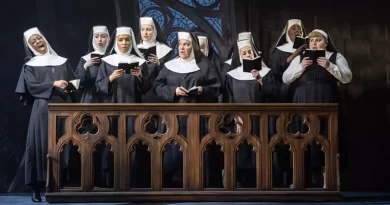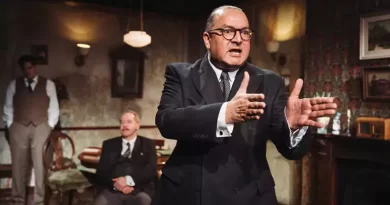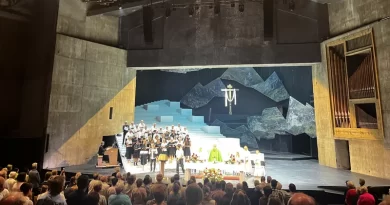“Krapp’s Last Tape” at York Theatre Royal
Jeremy Malies in North Yorkshire
28 April 2025
Worried perhaps about potassium intake, Harold Pinter dispensed with the bananas when he performed Samuel Beckett’s Krapp’s Last Tape at the Royal Court in 2006. But he was using a motorized wheelchair that would have put paid to the oldest joke in history, a man slipping on a banana skin. Yet even that sight gag failed to amuse in what for me was a joyless flaccid version of the piece at York Theatre Royal by Gary Oldman. This is a much-heralded return to the theatre where he made his stage debut in 1979 playing juvenile lead Lionel in the Ben Travers farce Thark. Now, at sixty-seven, Oldman is playing writer Krapp who is shown recording memories and listening to taped earlier memories on his sixty-ninth birthday.
As this all unspooled to no great purpose, I wondered if this was really the Oldman who won an Oscar for his portrayal of Churchill in Darkest Hour and who has impressed as a spy handler in the black comedy Apple TV thriller series Slow Horses, whose fans have contributed to brisk business at the box office.
Even Pinter, a long-time friend of Beckett and presumably with his own angle on the piece, asked Ian Rickson to direct him. But Oldman has not only directed himself, he has designed the production. The text is about self-discovery I suppose which in part justifies such a solo effort, but I still see this as hubris. Theatre-making should usually be collaborative.
I could detect no life history patterns in the jumble of office equipment and decrepit furniture that Oldman lurches around in while Krapp goes in search of his ledger book or a bottle of booze. And the layout suggests that Oldman has missed the point that these are filing boxes of the mind not just items of stationery.
For the early twenties Japanese couple next to me, Krapp’s reel-to-reel tape recorder might as well have been Edison phonographic cylinders. The analogue technology meant nothing to them. And like the rest of the audience, they became fidgety as Oldman (with no real justification from stage directions) spent an interminable time before getting things underway without any gain in energy or suspense as a result. It struck me as a mistake given that the text contains so few spoken lines anyway.
The pathos, you could go as far as calling it tragedy, in the plot is that the tape recordings confront Krapp not just with the fact that he has followed through on none of the goals he set his younger self but has also failed on every one of his resolutions in terms of delaying gratification.
Such is the continuing interest in the piece that Samuel West has announced he will play the role in 2036 when he is sixty-nine. And back in 2006, he put down the relevant recordings when he was thirty-nine. Crucially, West has requested direction from Katie Mitchell who has said that, if around, she will be there for him. Listening to the recording he had made, West decided he was unhappy with it and told Mitchell he was going to redo it. Mitchell’s reply was simple. “You can’t! That’s the whole point!” There is an integrity, modesty, and wit to all this which I didn’t detect in Oldman’s version.
Any positives? Of course. Oldman ramps up the energy levels, diction, and pomposity as his younger self in an impressive way. (“Pompous” is a word that Beckett uses in his directions – it’s certainly not me being critical.) At times Oldman excels with the irony and self-knowledge. And he is credible as a writer, a man who pores over his dictionary as he analyses the vocabulary he has used on tape as a younger man. The lighting by Malcolm Rippeth is excellent, and has Oldman becoming shadowy and even spectral as he moves through the recesses of his den. And yet even this is spelled out in Beckett’s directions and discussed in what Krapp says about his sense of loneliness.
Krapp’s Last Tape is assuredly not a period piece and unlikely to go out of fashion so long as we all think back to love affairs, bemoan our sins of omission, and are generally voyeurs on our own lives. But with the iPod now dating back thirty years, I just wonder if Beckett’s estate (known for being protective of the work) might sanction an experimental version using another recording medium.
“Perhaps my best years are gone?” is quite a deluded question from a sixty-nine-year-old. Krapp says that he wouldn’t want his younger years back and I’ve never known whether he means that he would not wish to re-experience them or would not want to refashion them. And in this production, I simply didn’t care either way.
Krapp asks himself (it’s a question on one of his tapes) whether he ever sang as a boy. This production never sings. I expected an emotional charge in the theatre, but it was absent. Even the applause from spectators (some of whom had already donned their merch clothing) was muted. Others, like the Japanese couple, left confused and wondering for a while if the play had a second act. Perhaps among all the disappointing aspects of Oldman’s project, this detail was the most damning for me. Beckett should communicate well to everybody and be the theatrical equivalent of Esperanto.
I usually leave this play going through the multiple layers of regret that I have myself – thinking about opportunities spurned and vital challenges shirked while also taking solace from a few small achievements. Here, there was no involvement; I didn’t truly wish to reflect on this iteration of the character.
Another production of the play with Stephen Rea (first seen in Dublin last year) opens at the Barbican shortly and will be reviewed here.









